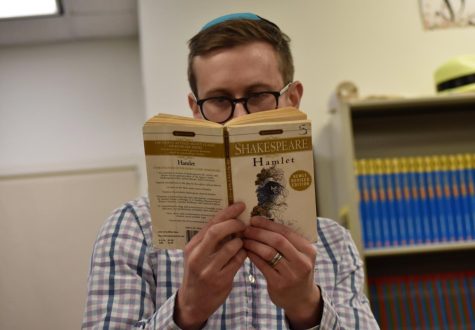What is Shakespeare’s Place in Education?
Senior Annie Fingersh excitedly showcases her copy of Hamlet as her classmates read and digest the 16th century play. Image by Zach Hardy
December 6, 2022
Throughout a student’s academic career, they read a plethora of literature ranging from outlandish fiction to historical non-fiction. One of the most prevailing authors among those works is William Shakespeare.
Shakespeare was born in the 16th century and wrote plays into the 17th century. If his works are hundreds of years old, why do we still spend so much time studying them?
Dr. Kristin Huston, the AP Language and Composition teacher this year says that we read Shakespeare because he is “one of the most widely known writers that talks about human experiences in really universal ways.”
Huston also notes that we read Shakespeare because of the massive influence he has had on literature, and how he helps us better understand more modern works and where they come from. “We want you guys to know what came before… it’s helping you create a timeline in your mind of literature.”
This ability to draw a line from the classics to modern literature is an important part of the Hyman Brand Hebrew Academy (HBHA) English curriculum. “The more classics you read, the more modern things you read, your brain starts to make connections between them… understanding those influences is important,” Huston says.
Students often find themselves disengaged with the content when reading Shakespeare because of the language barrier involved. While not a completely different language, Shakespeare writes in Early Modern English, which by comparison to other versions of English like Old English, is very close to what we speak today.

Despite this, the long-winded and complex sentence structure combined with words that are seldom used in our modern English turn most readers away from Shakespeare because they are forced to translate every sentence before they can start to dissect its meaning and literary significance.
Shakespeare presents a unique challenge to students that too often goes unrecognized. Huston explains that while reading Shakespeare, students are “decoding” Early Modern English. She says, “We really want you to know and understand when you see something like that.” She states that “there is value in doing something hard, even if it’s not the most fun we ever have in class.”
Micah Margolies, an English teacher at HBHA, shares this sentiment. He says that “it’s good to challenge students. If you want to become a good critical thinker, you have to be able to process information that’s not very easy for you to grapple with.”

Margolies also notes that reading and understanding Shakespeare can translate into different thinking skills. He says, “If you’re limiting yourself to only stuff that you are familiar with and in recent modern language, you’re going to have trouble if you want to learn, for example, the ethics of classic Greek philosophers.”
Along with his significant contributions to the English language, Shakespeare also affected literature hundreds of years after his time and surely will for hundreds of years to come. Margolies says “It’s pretty much impossible to [understand English literature] without having a general understanding of Shakespeare… The influence he’s had afterward is incalculable. Every story from the past 500 years can be traced back to him.”
Students at HBHA and beyond read Shakespeare in almost any English class they take, so understanding why we read it makes it so much easier to engage with the reading and the conversations.
Shakespeare’s influences on literature and language go unnoticed by a majority of students, and truly understanding Shakespeare and his works will help students learn critical thinking skills that they will need to educate themselves on anything they are interested in. This will help them get over challenges where material might not be interesting and give them the ability to push through rather boring content to reach the information and knowledge they need to succeed.














































































